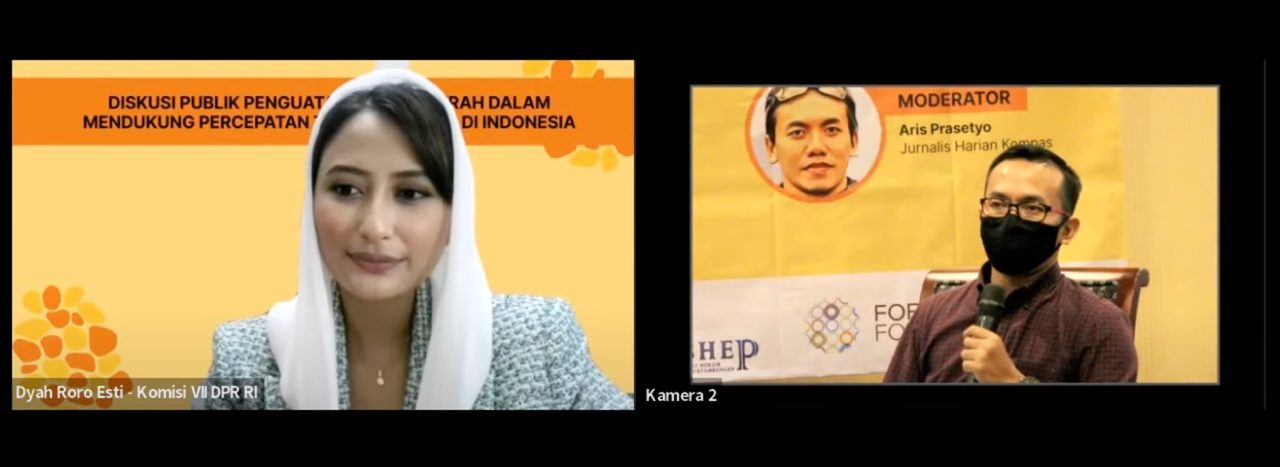Jakarta – The national energy transition policy requires support from various parties, including the Regional Government (Pemda). However, its role in managing and utilizing Renewable Energy (RE) is still considered limited. It was revealed in a public discussion organized by the Directorate General of Regional Development (Ditjen Bina Bangda), Ministry of Home Affairs (Kemendagri) in collaboration with Publish What You Pay (PWYP) Indonesia, Center for Energy and Mining Law Studies (PUSHEP) and Trend Asia with the support of the Ford Foundation on Thursday (10/2), hybrid in Jakarta.
Sugeng Hariyono, Plt. Director General (Dirjen) Bina Bangda, Ministry of Home Affairs, explained that local governments have an essential role in supporting the energy transition policy, which has now become a national strategic issue.
“This role can be done through several strategic steps, including the development of renewable energy, the implementation of energy efficiency, energy conservation, and the application of technology,” Sugeng Hariyono said.
However, the regions still face several challenges, especially the limited authority. Slamet Mulyanto Sudarsono, Head of the Energy Division, Energy and Mineral Resources Agency (ESDM) of West Java Province, explained that although the regional government has a RE target, the limited authority makes it difficult to move. Indirectly also related to the difficulty of providing budget allocations.
Christianus Benny, Head of the ESDM Service of East Kalimantan Province (Kaltim), also conveyed the same. “At present, the East Kalimantan Regional Government is still waiting for strategic steps from the central government, especially infrastructure and regulatory support. The reason is that East Kalimantan has a large and diverse renewable energy potential. However, it cannot be utilized optimally due to limited authority.”
“One of the policies needed is the provision of flexibility to the regions to use the budget for RE development tailored to regional potential. This policy does not need to be limited by national uniformity, “said Christianus.
Adding about regulations, Member of Commission VII DPR RI, Dyah Roro Esti, explained that currently, the parliament is discussing the Draft Law (RUU) on New and Renewable Energy (EBT) which is one of the priority bills in the National Legislation Program (Prolegnas) in 2022. The EBT Bill has been completed at the Commission level and is awaiting the discussion results at the Legislation Body (Baleg).
Dyah Roro Esti also reported that Commission VII, together with the Government, actively encourages each region to have its own Regional Energy General Plan (RUED). At least 22 of 34 Provinces have completed and implemented their RUED documents, while there are still 12 more Provinces in the preparation process.
Highlighting a different aspect, Tri Mumpuni, Executive Director of the Business Initiative and People’s Economy (IBEKA), said that the community had made various independent efforts in managing and utilizing the RE potential in each region with affordable technological capital.
“These things we should develop. This means that the community must be given space to innovate to meet their own energy needs so that the Government only facilitates what already exists in the community,” said Tri Mumpuni.
Regarding authority, the Ministry of Home Affairs and the Ministry of Energy and Mineral Resources are drafting a Draft Presidential Regulation (Perpres) on the Division of Government Affairs in the Energy and Mineral Resources Sector in the EBT Sub-Sector. In principle, the drafting of the Perpres calls concurrent government affairs not listed in the Local Government Law to be the authority of each level whose arrangements are stipulated by Perpres. Through this management strengthening, regional governments can provide more optimal support in achieving national development in the energy sector, especially in reaching the target portion of EBT in the energy mix and reducing greenhouse gas emissions.
Author: Ayubi
Reviewer: Meliana Lumbantoruan, Aryanto Nugroho
Translator: Raudatul Jannah
